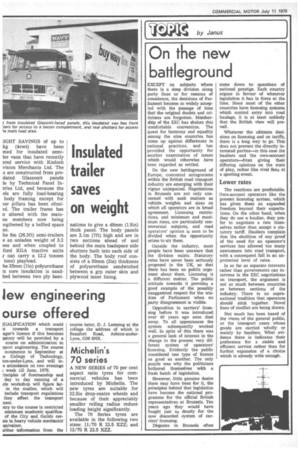On the new battleground
Page 44

If you've noticed an error in this article please click here to report it so we can fix it.
EXCEPT on subjects where there is a deep division along party lines or for reasons of conscience, the 'decisions of Parliament become so widely accepted with the passage of time that the original doubts and criticisms are forgotten. Membership of the EEC has Shaken this comfortable convention. The quest for harmony and equality among the nine countries has come up against differences in national practices, and has provided the opportunity for another examination of issues which would otherwise have been regarded as settled.
On the new battleground of Europe, concealed antagonisms within the British road transport industry are emerging with their vigour unimpaired. Negotiations in Brussels are not only concanned with such matters as vehicle weights and sizes on which all operetors are in broad agreement. Licensing restriceions, and Minimum and maxi, mum rates, are particularly controversial 'subjects, and road operators' opinion is seen to be divided when the opportunity arises to air them.
Outside the industry, most people have been unaware that the division exists. Statutory rates have never been seriously proposed in the UK, so that there has been no public argument about them. Licensing is a different matter. The public attitude towards it provides a good example of the possibly exaggerated respect for the wisdom of Parliament when no party disagreement is visible.
Opposition to .carriers' 'licensing before it was introduced over 40 years ago soon died away. To all appearances the system subsequently worked well. In spite of this there was a general lack of interest in the 'Change to the present very different system :of operators' licensing. Evidently the public coneidered one type of licence as good as another. The only puzzle was why the politicians bothered themselves with a freSh 'batch of legislation.
However, little !genuine desire there may have been for it, the principles behind that legislation have become the national programme for the official British representatives at Brussels. Ten years 'age they would have fought just as dourly for the now discarded .syetem of carriers' licensing.
Disputes in Brussels often come down to questions of national preStige. Each country argues in favour of whatever legislation it has in force at the time. Since most of the other countries have licensing systems which control entry into road haulage, it is at least unlikely that the British view will prevail.
Whatever the ultimate decisions on licensing and on tariffs, there is a long way to go. This does not prevent the directly interested parties—in this case the hauliers and the ,own-account operators--from giving their differing opinions on the state of play, rather like revel fans at a sporting event.
Lower rates
The reactions are predictable. Own-account operators like the present licensing system, Which has given them an expanded freedom beyond their expectations. On the other hand, when they de use a haulier, they prefer to negotiate a rate themselves rather than accept a statutory tariff. Hauliers complain that the abolition of any proof of the need for an operator's services has allowed too many newcomers into road transport, with a consequent fall in an unprotected level of rates.
In so far as separate interests rather than governments can intervene in the EEC negotiations on transport, the argument is not so much between countries as between sections of the industry. There is no supranational tradition that operators should stick together. Novel lines of 'conflict are being drawn.
Not much has been heard of the views, of the general or the transport users whose goods are carried wholly or mainly by hauliers. What evidence there 'is indicates their preference for a stable and efficient service rather than for further expansion of a .choice which is already wide enough.












































































































































